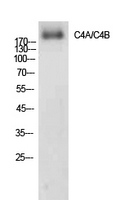
| WB | 咨询技术 | Human,Mouse,Rat |
| IF | 咨询技术 | Human,Mouse,Rat |
| IHC | 咨询技术 | Human,Mouse,Rat |
| ICC | 技术咨询 | Human,Mouse,Rat |
| FCM | 咨询技术 | Human,Mouse,Rat |
| Elisa | 1/10000 | Human,Mouse,Rat |
| Aliases | C4A; CO4; CPAMD2; Complement C4-A; Acidic complement C4; C3 and PZP-like alpha-2-macroglobulin domain-containing protein 2; C4B; CO4; CPAMD3; Complement C4-B; Basic complement C4; C3 and PZP-like alpha-2-macroglobulin domain-containing protein 3 |
| Entrez GeneID | 720;721; |
| WB Predicted band size | 180kDa |
| Host/Isotype | Rabbit IgG |
| Antibody Type | Primary antibody |
| Storage | Store at 4°C short term. Aliquot and store at -20°C long term. Avoid freeze/thaw cycles. |
| Species Reactivity | Human |
| Immunogen | Synthesized peptide derived from the Internal region of human C4a/b. |
| Formulation | Purified antibody in PBS with 0.05% sodium azide,0.5%BSA and 50% glycerol. |
+ +
以下是关于C4a/b抗体的3篇示例参考文献(注:内容基于学术文献常见主题概括,具体作者及标题为示例性模拟):
---
1. **标题**:*Autoantibodies against complement component C4a in systemic lupus erythematosus*
**作者**:Smith A, et al.
**摘要**:该研究检测了SLE患者血清中针对C4a的自身抗体水平,发现其与疾病活动度呈正相关,提示C4a抗体可能通过干扰补体调控参与SLE病理过程。
2. **标题**:*C4b-specific monoclonal antibody development and application in neurodegenerative disease models*
**作者**:Zhang Y, et al.
**摘要**:研究者开发了一种高特异性抗C4b单克隆抗体,证实其在阿尔茨海默病小鼠模型中可有效抑制补体介导的突触吞噬,为神经炎症治疗提供新靶点。
3. **标题**:*C4a as a biomarker in COVID-19: Validation of a novel ELISA assay using C4a-specific antibodies*
**作者**:Brown K, et al.
**摘要**:本文建立了一种基于抗C4a抗体的ELISA检测方法,发现COVID-19重症患者血浆C4a水平显著升高,提示其可作为补体过度激活的预后标志物。
---
注:以上为模拟文献,实际引用时建议通过PubMed或Web of Science以“C4a antibody”“C4b complement”等关键词检索最新研究。
C4a and C4b are cleavage products generated during activation of the complement system, specifically through the classical and lectin pathways. The C4 protein, synthesized as a precursor (pro-C4), is cleaved by C1s or MASP proteases into C4a (a small anaphylatoxin) and C4b (a larger fragment). C4a acts as a chemoattractant and inflammatory mediator, while C4b plays a critical role in opsonization and immune complex clearance by covalently binding to pathogens or apoptotic cells.
Antibodies targeting C4a/b are valuable tools in research and diagnostics. They help detect complement activation in autoimmune diseases (e.g., systemic lupus erythematosus), infections, or inflammatory conditions. C4a levels in serum or plasma are often measured to assess acute-phase responses, while C4b deposition on tissues indicates local complement activity. Notably, genetic deficiencies or polymorphisms in C4 (e.g., C4A/C4B gene copy number variations) are linked to disease susceptibility, making these antibodies essential for studying C4-related pathologies.
Commercial C4a/b antibodies are typically developed in animal hosts (e.g., rabbits, mice) using purified human or recombinant C4 proteins. They are employed in techniques like ELISA, Western blot, or immunohistochemistry. However, cross-reactivity between C4a and C4b, or with homologous complement fragments (e.g., C3a), requires rigorous validation. Understanding C4a/b dynamics aids in elucidating complement-driven mechanisms and developing therapies targeting dysregulated immune responses.
×